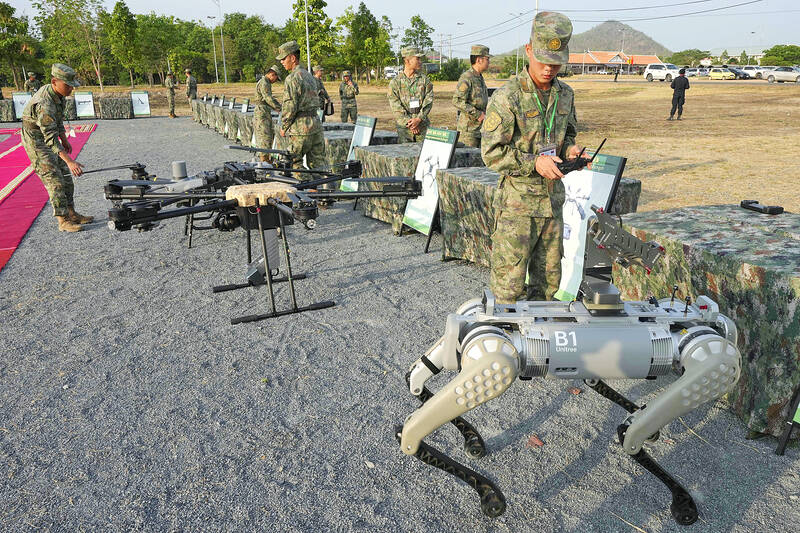China’s military yesterday showed off its machine-gun equipped robot battle “dogs” at the start of its biggest ever drills with Cambodian forces.
More than 2,000 troops, including 760 Chinese military personnel, are taking part in the drills at a remote training center in central Kampong Chhnang Province and at sea off Preah Sihanouk Province.
The 15-day exercise, dubbed Golden Dragon, also involves 14 warships — three from China — two helicopters and 69 armored vehicles and tanks, and includes live-fire, anti-terrorism and humanitarian rescue drills.

Photo: AP
The hardware on show included the so-called “robodogs” — remote-controlled four-legged robots with automatic rifles mounted on their backs.
Handlers kept the dogs of war on the leash, demonstrating only their walking capabilities to watching journalists and top brass — not their shooting skills.
Opening the exercises, Cambodian armed forces commander-in-chief Vong Pisen said that they would “enhance the capabilities” of the two armies in the fight against terrorism.
Vong Pisen said that Cambodia would never allow a foreign military base on its territory, echoing previous assertions by Cambodian leaders.
After Cambodia dismantled facilities at Ream naval base near the Cambodian port city of Sihanoukville, built partly with US funding and having played host to US military exercises, China began funding its renovation.
Two Chinese warships docked at Ream in December last year for the first time after work began to expand the base.
Washington says that Ream could give Beijing a key strategic position on Gulf of Thailand near the disputed South China Sea.
Earlier this week, Cambodian army spokesman Thong Solimo told reporters that the exercises were biggest ever of their kind and China would cover the cost.

THE TRAGEDY OF PUNCH: Footage of the seven-month-old Japanese macaque has gone viral online after he was rejected by his mother and formed a bond with a soft toy A baby monkey in Japan has captured hearts around the world after videos of him being bullied by other monkeys and rejected by his mother went viral last week. Punch, a Japanese macaque, was born in July last year at Ichikawa City Zoo. He has drawn international attention after zookeepers gave him a stuffed orangutan toy after he was abandoned by his mother. Without maternal guidance to help him integrate, Punch has turned to the toy for comfort. He has been filmed multiple times being dragged and chased by older Japanese macaques inside the enclosure. Early clips showed him wandering alone with

South Korea would soon no longer be one of the few countries where Google Maps does not work properly, after its security-conscious government reversed a two-decade stance to approve the export of high-precision map data to overseas servers. The approval was made “on the condition that strict security requirements are met,” the South Korean Ministry of Land, Infrastructure and Transport said. Those conditions include blurring military and other sensitive security-related facilities, as well as restricting longitude and latitude coordinates for South Korean territory on products such as Google Maps and Google Earth, it said. The decision is expected to hurt Naver and Kakao

Australian Prime Minister Anthony Albanese yesterday said he did not take his security for granted, after he was evacuated from his residence for several hours following a bomb threat sent to a Chinese dance group. Albanese was evacuated from his Canberra residence late on Tuesday following the threat, and returned a few hours later after nothing suspicious was found. The bomb scare was among several e-mails threatening Albanese sent to a representative of Shen Yun, a classical Chinese dance troupe banned in China that is due to perform in Australia this month, a spokesperson for the group said in a statement. The e-mail

TENSIONS: The march went ahead without clashes, but arrests were still possible as police investigate suspects behind Nazi salutes, racist slurs and homophobic insults Thousands of people on Saturday marched in southeastern France under heavy security in tribute to a far-right activist whose killing, blamed on the hard left, has put the country on edge. The crowd — many wearing black and some covering their lower faces with masks — marched through the city of Lyon carrying flowers and placards bearing pictures of Quentin Deranque and the words: “justice for Quentin” and “the extreme left kills.” The 23-year-old died from head injuries following clashes between radical left and far-right supporters on the sidelines of a demonstration against a politician from the left-wing France Unbowed